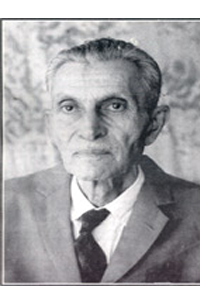J. K. Mehta
Appearance
J. K. Mehta | |
|---|---|
 | |
| Born | Jamshed Kaikhushro Mehta[1] 14 December 1901 |
| Died | 9 August 1980 (aged 78)[2] |
| Alma mater | University of Allahabad (PhD) |
| Occupation(s) | Economist, Philosopher, Professor & Author[3] |
Jamshed Kaikhusro Mehta, known professionally as J. K. Mehta (14 December 1901 – 9 August 1980) was an Indian philosopher and economist. He was born to K. M. Mehta in Rajnandgaon in 1901. He completed his graduation from Moir Central College and attended University of Allahabad for post graduation.
Work and philosophy
Key ideas
J. K. Mehta is known for his idea of Wantlessness. In 1931, he discovered the theory of Marginal Revenue. Joan Robinson mentions his work in her book.[4] He was very inspired by Mahatma Gandhi and spread the Gandhian Theory of Economics.[5]
See also
List of University of Allahabad alumni
Bibliography
- Economics of Growth (First Edition: 1964)[6]
- A Philosophical Interpretation of Economics[7]
- Rhyme, rhythm and truth in economics[8]
- The elements of economics mathematically interpreted, (First Edition: 1932)
- Gandhian Thought [9]
References
- ^ "Remembering J.K.Mehta on his 34th Death Anniversary". Active India.
- ^ "Remembering J.K.Mehta on his 34th Death Anniversary". Active India.
- ^ "The Indian Journal of Economics - University of Allahabad". www.indianjournalofeconomics.com.
- ^ "J.K. Mehta's Theory of Wantlessness". Your Article Library. 5 April 2014. Retrieved 1 September 2020.
- ^ "ISBN 9780836413885 - Gandhian Thought". isbnsearch.org.
- ^ Mehta, J. K (1964). Economics of growth. Asia Pub. House. OCLC 13799094.
- ^ Macfie, A. L. (1963). "Review of A Philosophical Interpretation of Economics". The Economic Journal. 73 (289): 106–108. doi:10.2307/2228409. JSTOR 2228409.
- ^ Mehta, J. K (1967). Rhyme, rhythm and truth in economics. Asia Pub. House. OCLC 473963.
- ^ "ISBN 9780836413885 - Gandhian Thought". isbnsearch.org.
